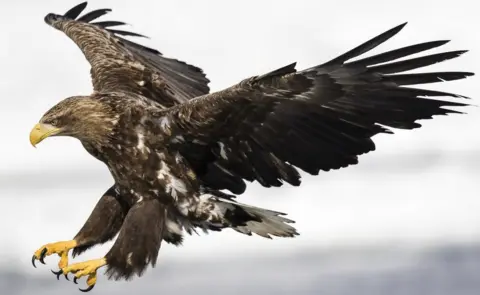Rare white-tailed eagles found dead in NI were illegally poisoned
 Getty Images
Getty ImagesTwo rare white-tailed eagles found dead in County Antrim two months ago were poisoned, police have confirmed.
Their remains were discovered near Glenhead Road between Ballymena and Larne in mid-May.
Post-mortem examinations found that both birds tested positive for the insecticide bendiocarb.
It is often used in commercial products but it is a criminal offence to leave it outside where wild animals could consume it.
The Royal Society for the Protection of Birds (RSPB) is offering a reward of £5,000 for information leading to a conviction over the death of the birds.
The charity's Northern Ireland director Joanne Sherwood described the illegal poisoning as "absolutely devastating".
How the birds consumed the insecticide is being investigated by police.
One of the eagles was born in Norway and brought as a chick to be released in the lower Shannon estuary in the Republic of Ireland in 2022.
Conservationists monitoring the bird, which was fitted with a satellite tag, became concerned when the tag's data indicated it had stopped moving, leading them to discover its remains on 15 May.
 PSNI
PSNIThe second bird, which was located nearby, was an unmarked, immature bird of unknown origin, potentially from Scotland or Ireland, according to the RSPB.
Police Supt Johnston McDowell said the test results suggested that an individual had placed the insecticide outside illegally.
"Bendiocarb is present in the trade product Ficam D, a powder which is only permitted for indoor use to control crawling insects such as wasps and ants," he said.
"So using this active ingredient in fields would be a breach of biocidal products regulation.
"The illegal killing of these beautiful birds in a popular rural area is disgraceful.
"For any individual to think that they can ignore the law and lay poisonous bait which has led to the killing of these birds is unacceptable and will not be tolerated."
Police officers, along with support from the National Wildlife Crime Unit, have been conducting house-to-house inquiries in the areas where the birds had been before they were found dead.
RSPB investigations officer Dean Jones said poison left out in the open was posed a huge risk to wildlife as well as people and pets.
"It is not only illegal, but extremely irresponsible and dangerous," he said.
"We implore that anyone who knows any information on who is responsible for the death of these birds to get in touch with the PSNI."